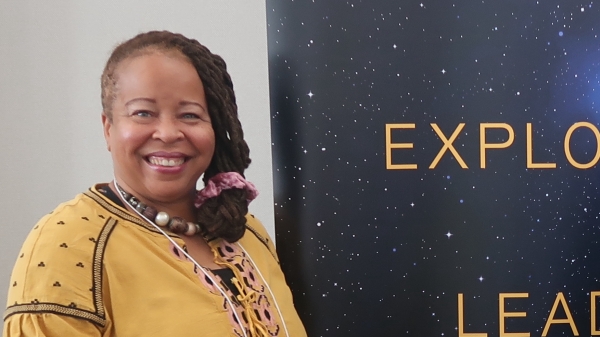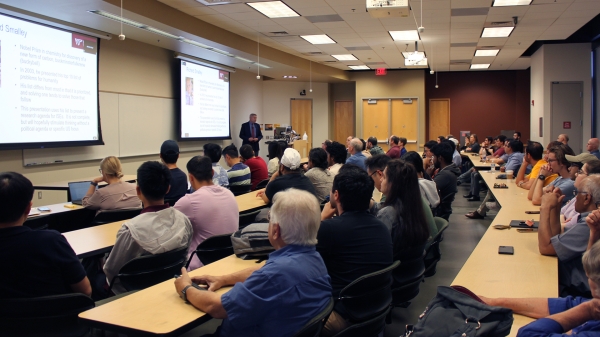Center for Science and the Imagination and Open Technology Institute launch 'AI Policy Futures'
New project uses science fiction as a tech policy tool

Artificial intelligence (AI) is quickly becoming a ubiquitous feature of 21st-century life, raising serious questions about the future of work, privacy, democracy and even humanity itself.
Storytelling is a powerful tool for helping people and policymakers understand and adapt to technological change, but our fictional narratives aren’t keeping up with the reality of AI. Instead, we keep recycling hopes and fears from classic science fiction books like Isaac Asimov’s "I, Robot" and films like "The Terminator." Today, Arizona State University and New America’s Open Technology Institute (OTI) are launching AI Policy Futures, a new project that will combine academic research, science fiction and technology policy to help us discover and create new narratives around AI’s future.
“Science fiction stories exert a powerful influence on how we think about technology and the future,” said Ed Finn, the project’s co-director and the founding director of ASU’s Center for Science and the Imagination (CSI). “But if we spend all of our time looking over our shoulders for killer robots, that means we are not looking ahead to discern the outcomes we might actually want.”
The yearlong project, a joint effort between CSI and OTI, will create a taxonomy of AI in science fiction literature, film and games; host a workshop of sci-fi writers, futurists and experts in AI tech and policy aimed at identifying new areas for research and storytelling; and publish a set of original science fiction stories and nonfiction essays to expand our thinking about the policy challenges AI poses. The project’s launch is supported by the William and Flora Hewlett Foundation.
“The overarching goal of AI Policy Futures is to mine the science fiction of the past for new ways of thinking about AI in the present, and to use original science fiction today to generate fresh ideas about the AI of tomorrow, all with an eye toward helping us make better decisions about how we design, use and regulate AI,” said OTI director and project co-director Kevin Bankston. “This new project will bring together a mini think tank of real-world AI experts, tech policy wonks and sci-fi visionaries to help us imagine an even broader range of possible futures for AI — both the dark futures that we want to avoid and the brighter tomorrows that we should all work toward.”
To shape and inform this work, AI Policy Futures will be guided by a growing advisory board of prominent thinkers and leaders in the fields of AI and science fiction:
- Madeline Ashby — futurist and author of novels including the Machine Dynasty series and "Company Town."
- Kanta Dihal — postdoctoral researcher at the University of Cambridge’s Leverhulme Centre for the Future of Intelligence.
- Cory Doctorow — activist, journalist and bestselling author of acclaimed novels such as "Walkaway," "Little Brother" and "Homeland."
- Tim Hwang — director of the Harvard-MIT Ethics and Governance of AI Initiative.
- Chris Noessel — keeper of scifiinterfaces.com, coauthor of "Make It So: Interaction Design Lessons from Science Fiction" and author of "Designing Agentive Technology: AI That Works for People," and lead designer with IBM’s Watson Customer Engagement.
- Malka Older — aid worker, sociologist and author of the acclaimed Centenal Cycle novels: "Infomocracy," "Null States" and "State Tectonics."
Arizona State University’s Center for Science and the Imagination brings writers, artists and other creative thinkers into collaboration with scientists, engineers and technologists to reignite humanity’s grand ambitions for innovation and discovery. The center serves as a network hub for audacious moonshot ideas and a cultural engine for thoughtful optimism. CSI provides a space for productive collaboration between the humanities and the sciences, brings human narratives to scientific questions and explores the full social implications of cutting-edge research.
The Open Technology Institute is a public interest organization that works at the intersection of technology and policy to ensure that every community has equitable access to digital technology and its benefits. OTI is a program of New America, a think and action tank dedicated to renewing America by continuing the quest to realize our nation’s highest ideals, honestly confronting the challenges caused by rapid technological and social change and seizing the opportunities those changes create.
More Science and technology

Associate professor shares her journey from NASA to ASU
From leading space missions to designing and building spaceflight hardware and training students in space science and engineering…

Famed systems engineer inspires ASU to tackle global problems
“Providing great talent with great opportunity can make a great difference.” Such was a key part of the message delivered by G.…

The science behind chronic stress
Stress comes in many shapes and sizes. There’s the everyday stress of preparing for a final exam or being stuck in traffic. And…